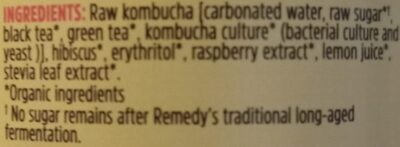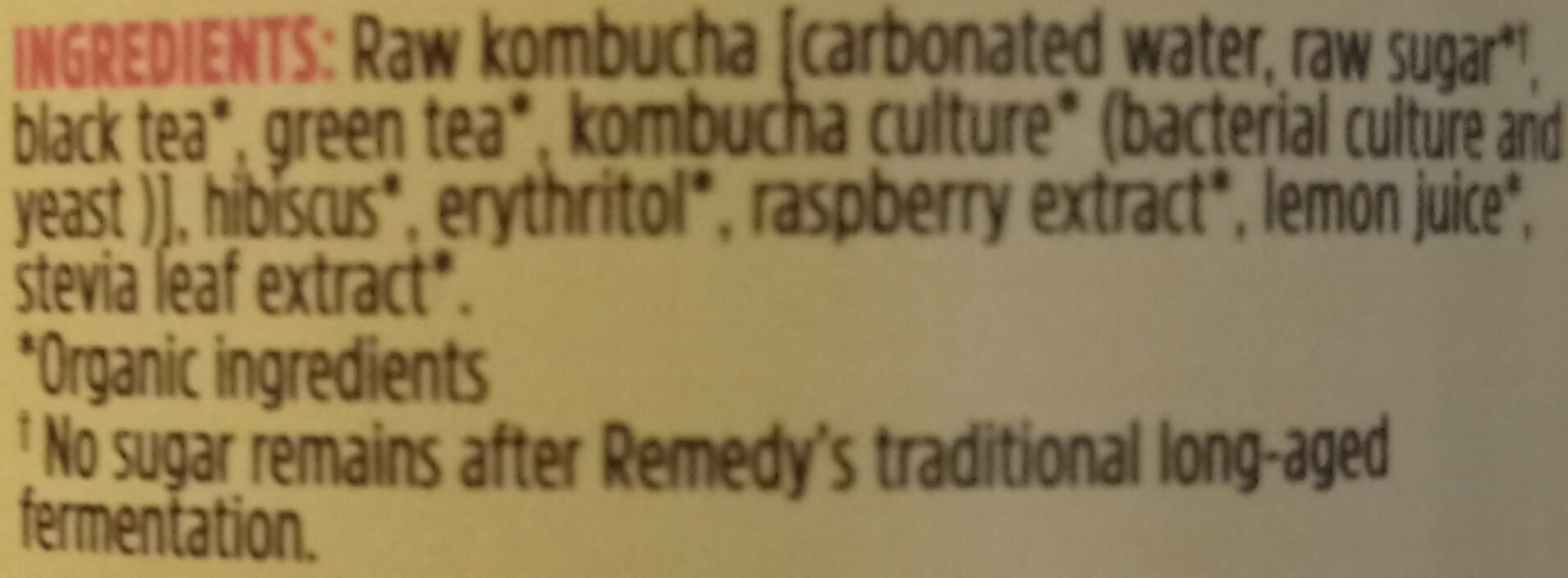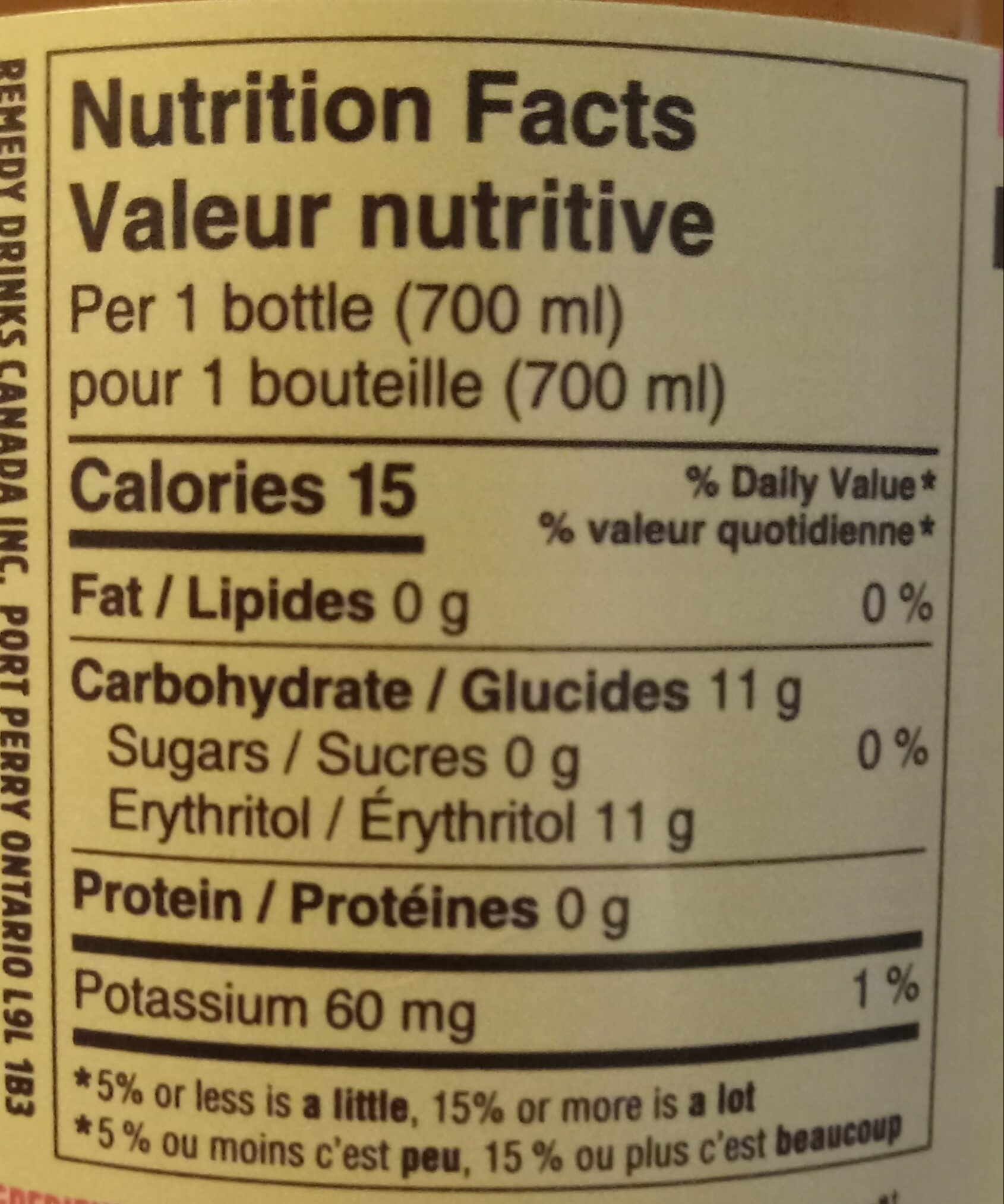Help us make food transparency the norm!
As a non-profit organization, we depend on your donations to continue informing consumers around the world about what they eat.
The food revolution starts with you!
Organic Raspberry Lemonade Kombucha - Remedy - 700 mL
Organic Raspberry Lemonade Kombucha - Remedy - 700 mL
This product page is not complete. You can help to complete it by editing it and adding more data from the photos we have, or by taking more photos using the app for Android or iPhone/iPad. Thank you!
×
Barcode: 9350271000225 (EAN / EAN-13)
Quantity: 700 mL
Packaging: Pet-bottle
Brands: Remedy
Categories: Beverages, Fermented foods, Fermented drinks, Tea-based beverages, Kombuchas
Labels, certifications, awards:
Low or no sugar, Organic, Vegetarian, Vegan, Canada Organic, No sugar, Unpasteurized, ACO Certified Organic, I Quit Sugar Tick
Manufacturing or processing places: Belgium
Stores: Real Canadian Superstore
Countries where sold: Canada
Matching with your preferences
Health
Ingredients
-
13 ingredients
Raw kombucha (carbonated water, raw sugar, black tea, green tea, kombucha culture [bacterial culture, yeast]), Hibiscus, Erythritol, Raspberry extract, Lemon juice, Stevia leaf extract.
Food processing
-
Ultra processed foods
Elements that indicate the product is in the 4 - Ultra processed food and drink products group:
- Additive: E960 - Steviol glycosides
- Additive: E968 - Erythritol
Food products are classified into 4 groups according to their degree of processing:
- Unprocessed or minimally processed foods
- Processed culinary ingredients
- Processed foods
- Ultra processed foods
The determination of the group is based on the category of the product and on the ingredients it contains.
Additives
-
E960 - Steviol glycosides
Steviol glycoside: Steviol glycosides are the chemical compounds responsible for the sweet taste of the leaves of the South American plant Stevia rebaudiana -Asteraceae- and the main ingredients -or precursors- of many sweeteners marketed under the generic name stevia and several trade names. They also occur in the related species Stevia phlebophylla -but in no other species of Stevia- and in the plant Rubus chingii -Rosaceae-.Steviol glycosides from Stevia rebaudiana have been reported to be between 30 and 320 times sweeter than sucrose, although there is some disagreement in the technical literature about these numbers. They are heat-stable, pH-stable, and do not ferment. Additionally, they do not induce a glycemic response when ingested, because humans can not metabolize stevia. This makes them attractive as natural sugar substitutes for diabetics and other people on carbohydrate-controlled diets. Steviol glycosides stimulate the insulin secretion through potentiation of the β-cell, preventing high blood glucose after a meal. The acceptable daily intake -ADI- for steviol glycosides, expressed as steviol equivalents, has been established to be 4 mg/kg body weight/day, and is based on no observed effects of a 100 fold higher dose in a rat study.Source: Wikipedia
-
E968 - Erythritol
Erythritol: Erythritol --2R,3S--butane-1‚2,3‚4-tetrol- is a sugar alcohol -or polyol- that has been approved for use as a food additive in the United States and throughout much of the world. It was discovered in 1848 by Scottish chemist John Stenhouse. It occurs naturally in some fruit and fermented foods. At the industrial level, it is produced from glucose by fermentation with a yeast, Moniliella pollinis. Erythritol is 60–70% as sweet as sucrose -table sugar- yet it is almost noncaloric, does not affect blood sugar, does not cause tooth decay, and is partially absorbed by the body, excreted in urine and feces. Under U.S. Food and Drug Administration -FDA- labeling requirements, it has a caloric value of 0.2 kilocalories per gram -95% less than sugar and other carbohydrates-, though nutritional labeling varies from country to country. Some countries, such as Japan and the United States, label it as zero-calorie; the European Union labels it 0 kcal/g.Source: Wikipedia
Ingredients analysis
-
Palm oil free
No ingredients containing palm oil detected
Unrecognized ingredients: Bacterial-cultureSome ingredients could not be recognized.
We need your help!
You can help us recognize more ingredients and better analyze the list of ingredients for this product and others:
- Edit this product page to correct spelling mistakes in the ingredients list, and/or to remove ingredients in other languages and sentences that are not related to the ingredients.
- Add new entries, synonyms or translations to our multilingual lists of ingredients, ingredient processing methods, and labels.
If you would like to help, join the #ingredients channel on our Slack discussion space and/or learn about ingredients analysis on our wiki. Thank you!
-
Vegan
No non-vegan ingredients
Unrecognized ingredients: Raw kombucha, Bacterial-cultureSome ingredients could not be recognized.
We need your help!
You can help us recognize more ingredients and better analyze the list of ingredients for this product and others:
- Edit this product page to correct spelling mistakes in the ingredients list, and/or to remove ingredients in other languages and sentences that are not related to the ingredients.
- Add new entries, synonyms or translations to our multilingual lists of ingredients, ingredient processing methods, and labels.
If you would like to help, join the #ingredients channel on our Slack discussion space and/or learn about ingredients analysis on our wiki. Thank you!
-
Vegetarian
No non-vegetarian ingredients detected
Unrecognized ingredients: Raw kombucha, Bacterial-cultureSome ingredients could not be recognized.
We need your help!
You can help us recognize more ingredients and better analyze the list of ingredients for this product and others:
- Edit this product page to correct spelling mistakes in the ingredients list, and/or to remove ingredients in other languages and sentences that are not related to the ingredients.
- Add new entries, synonyms or translations to our multilingual lists of ingredients, ingredient processing methods, and labels.
If you would like to help, join the #ingredients channel on our Slack discussion space and/or learn about ingredients analysis on our wiki. Thank you!
-
Details of the analysis of the ingredients
We need your help!
Some ingredients could not be recognized.
We need your help!
You can help us recognize more ingredients and better analyze the list of ingredients for this product and others:
- Edit this product page to correct spelling mistakes in the ingredients list, and/or to remove ingredients in other languages and sentences that are not related to the ingredients.
- Add new entries, synonyms or translations to our multilingual lists of ingredients, ingredient processing methods, and labels.
If you would like to help, join the #ingredients channel on our Slack discussion space and/or learn about ingredients analysis on our wiki. Thank you!
en: Raw kombucha (carbonated water, raw sugar, black tea, green tea, kombucha culture (bacterial culture, yeast)), Hibiscus, Erythritol, Raspberry, Lemon juice, Stevia leaf extract- Raw kombucha -> en:raw-kombucha - percent_min: 16.6666666666667 - percent_max: 100
- carbonated water -> en:carbonated-water - vegan: yes - vegetarian: yes - ciqual_food_code: 18066 - percent_min: 16.6666666666667 - percent_max: 100
- raw sugar -> en:unrefined-sugar - vegan: yes - vegetarian: yes - ciqual_proxy_food_code: 31016 - percent_min: 0 - percent_max: 0
- black tea -> en:black-tea - vegan: yes - vegetarian: yes - ciqual_food_code: 18154 - percent_min: 0 - percent_max: 0
- green tea -> en:green-tea - vegan: yes - vegetarian: yes - ciqual_food_code: 18155 - percent_min: 0 - percent_max: 0
- kombucha culture -> en:kombucha-culture - vegan: maybe - vegetarian: maybe - percent_min: 0 - percent_max: 0
- bacterial culture -> en:bacterial-culture - percent_min: 0 - percent_max: 0
- yeast -> en:yeast - vegan: yes - vegetarian: yes - percent_min: 0 - percent_max: 0
- Hibiscus -> en:roselle-flower - vegan: yes - vegetarian: yes - percent_min: 0 - percent_max: 50
- Erythritol -> en:e968 - vegan: yes - vegetarian: yes - percent_min: 0 - percent_max: 33.3333333333333
- Raspberry -> en:raspberry - vegan: yes - vegetarian: yes - ciqual_food_code: 13015 - percent_min: 0 - percent_max: 25
- Lemon juice -> en:lemon-juice - vegan: yes - vegetarian: yes - ciqual_food_code: 2028 - percent_min: 0 - percent_max: 20
- Stevia leaf extract -> en:e960 - vegan: yes - vegetarian: yes - percent_min: 0 - percent_max: 16.6666666666667
Nutrition
-
Good nutritional quality
⚠ ️Warning: the amount of fruits, vegetables and nuts is not specified on the label, it was estimated from the list of ingredients: 7This product is considered a beverage for the calculation of the Nutri-Score.
Positive points: 0
- Proteins: 0 / 5 (value: 0, rounded value: 0)
- Fiber: 0 / 5 (value: 0, rounded value: 0)
- Fruits, vegetables, nuts, and colza/walnut/olive oils: 0 / 10 (value: 7.81249999999999, rounded value: 7.8)
Negative points: 1
- Energy: 1 / 10 (value: 9, rounded value: 9)
- Sugars: 0 / 10 (value: 0, rounded value: 0)
- Saturated fat: 0 / 10 (value: 0, rounded value: 0)
- Sodium: 0 / 10 (value: 0, rounded value: 0)
The points for proteins are counted because the negative points are less than 11.
Nutritional score: (1 - 0)
Nutri-Score:
-
Nutrient levels
-
Fat in low quantity (0%)
What you need to know- A high consumption of fat, especially saturated fats, can raise cholesterol, which increases the risk of heart diseases.
Recommendation: Limit the consumption of fat and saturated fat- Choose products with lower fat and saturated fat content.
-
Saturated fat in low quantity (0%)
What you need to know- A high consumption of fat, especially saturated fats, can raise cholesterol, which increases the risk of heart diseases.
Recommendation: Limit the consumption of fat and saturated fat- Choose products with lower fat and saturated fat content.
-
Sugars in low quantity (0%)
What you need to know- A high consumption of sugar can cause weight gain and tooth decay. It also augments the risk of type 2 diabetes and cardio-vascular diseases.
Recommendation: Limit the consumption of sugar and sugary drinks- Sugary drinks (such as sodas, fruit beverages, and fruit juices and nectars) should be limited as much as possible (no more than 1 glass a day).
- Choose products with lower sugar content and reduce the consumption of products with added sugars.
-
Salt in low quantity (0%)
What you need to know- A high consumption of salt (or sodium) can cause raised blood pressure, which can increase the risk of heart disease and stroke.
- Many people who have high blood pressure do not know it, as there are often no symptoms.
- Most people consume too much salt (on average 9 to 12 grams per day), around twice the recommended maximum level of intake.
Recommendation: Limit the consumption of salt and salted food- Reduce the quantity of salt used when cooking, and don't salt again at the table.
- Limit the consumption of salty snacks and choose products with lower salt content.
-
-
Nutrition facts
Nutrition facts As sold
for 100 g / 100 mlAs sold
per serving (700 mL)Compared to: Kombuchas Energy 9 kj
(2 kcal)63 kj
(15 kcal)-82% Fat 0 g 0 g Saturated fat 0 g 0 g Carbohydrates 1.57 g 11 g -49% Fiber 0 g 0 g Sugars 0 g 0 g -100% Erythritol 1.57 g 11 g Proteins 0 g 0 g -100% Salt 0 g 0 g -100% Potassium 8.57 mg 60 mg Fruits‚ vegetables‚ nuts and rapeseed‚ walnut and olive oils (estimate from ingredients list analysis) 7.812 % 7.812 %
Environment
-
Eco-Score C - Moderate environmental impact
⚠ ️The full impact of transportation to your country is currently unknown.The Eco-Score is an experimental score that summarizes the environmental impacts of food products.→ The Eco-Score was initially developped for France and it is being extended to other European countries. The Eco-Score formula is subject to change as it is regularly improved to make it more precise and better suited to each country.Life cycle analysis
-
Average impact of products of the same category: B (Score: 63/100)
Category: Still soft drink with tea extract, with sugar and artificial sweetener(s)
Category: Still soft drink with tea extract, with sugar and artificial sweetener(s)
- PEF environmental score: 0.10 (the lower the score, the lower the impact)
- including impact on climate change: 0.52 kg CO2 eq/kg of product
Stage Impact Agriculture
34.3 %Processing
1.3 %Packaging
38.3 %Transportation
14.8 %Distribution
8.8 %Consumption
2.4 %
Bonuses and maluses
-
Missing origins of ingredients information
Malus:
⚠ ️ The origins of the ingredients of this product are not indicated.
If they are indicated on the packaging, you can modify the product sheet and add them.
If you are the manufacturer of this product, you can send us the information with our free platform for producers.
-
Packaging with a medium impact
Malus: -5
Shape Material Recycling Impact Bottle PET 1 - Polyethylene terephthalate Medium
Eco-Score for this product
-
Impact for this product: C (Score: 53/100)
Product: Organic Raspberry Lemonade Kombucha - Remedy - 700 mL
Life cycle analysis score: 63
Sum of bonuses and maluses: -5
Final score: 53/100
-
Carbon footprint
-
Equal to driving 0.3 km in a petrol car
52 g CO² per 100g of product
The carbon emission figure comes from ADEME's Agribalyse database, for the category: Still soft drink with tea extract, with sugar and artificial sweetener(s) (Source: ADEME Agribalyse Database)
Stage Impact Agriculture
19.2 %Processing
2.4 %Packaging
34.0 %Transportation
36.4 %Distribution
6.8 %Consumption
1.3 %
Packaging
-
Packaging with a medium impact
-
Packaging parts
Bottle (PET 1 - Polyethylene terephthalate)
-
Packaging materials
Material % Packaging weight Packaging weight per 100 g of product Plastic
-
Transportation
-
Origins of ingredients
Missing origins of ingredients information
⚠ ️ The origins of the ingredients of this product are not indicated.
If they are indicated on the packaging, you can modify the product sheet and add them.
If you are the manufacturer of this product, you can send us the information with our free platform for producers.Add the origins of ingredients for this product Add the origins of ingredients for this product
Report a problem
-
Incomplete or incorrect information?
Category, labels, ingredients, allergens, nutritional information, photos etc.
If the information does not match the information on the packaging, please complete or correct it. Open Food Facts is a collaborative database, and every contribution is useful for all.
Data sources
Product added on by kiliweb
Last edit of product page on by binzyboi.
Product page also edited by inf, louise1975, pumathunder, roboto-app, swipe-studio, yuka.WHZFaFRmeFlwNmd0bzhjT29DM24yNGhzNDZDUFlHeWFML002SUE9PQ.









